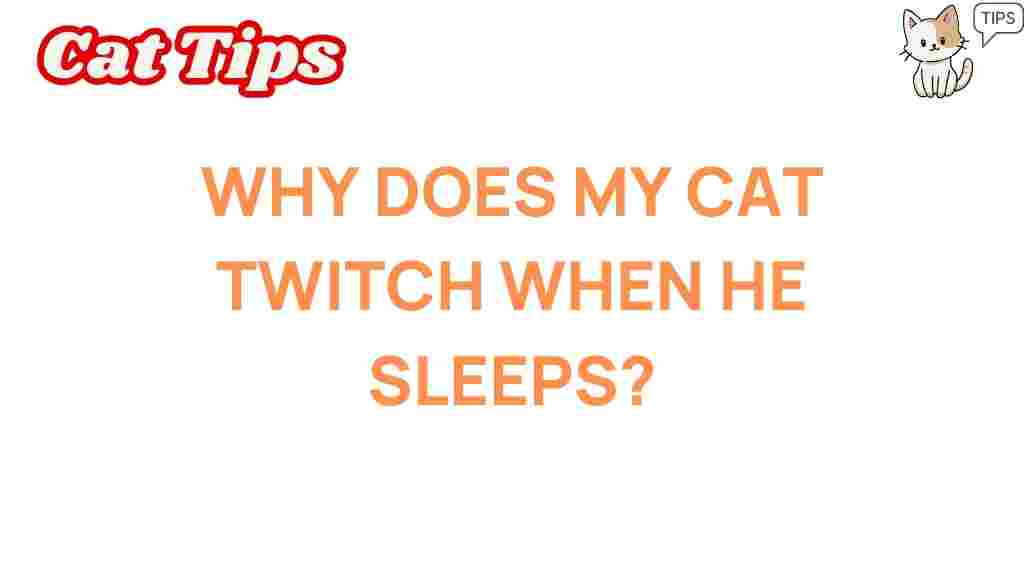Unraveling the Mystery: Why Does My Cat Twitch in Sleep?
As any cat owner knows, our feline friends can be quite mysterious creatures. One of the more curious behaviors many cat owners observe is when their beloved pets start twitching during sleep. This peculiar phenomenon often raises questions: Is my cat dreaming? Is something wrong? In this article, we will delve into the reasons behind cat twitching and help you understand what it means for your furry companion.
Understanding the Basics of Sleep in Cats
Before we dive into the specifics of cat twitching, it’s essential to understand how cats sleep. Unlike humans, cats experience multiple sleep cycles throughout the day, characterized by:
- Light Sleep: This is when a cat is most easily awakened. They may twitch or move during this phase.
- Deep Sleep: During this phase, cats are less responsive to external stimuli. This is when most of the twitching occurs.
- REM Sleep: This is the stage where dreaming occurs. It’s also when you might notice the most twitching, as the brain is highly active.
Understanding these sleep cycles can provide insight into your cat’s twitching behavior. Now, let’s explore why your cat might be twitching in their sleep.
Reasons Why Your Cat Might Be Twitching in Sleep
There are several reasons why a cat might exhibit twitching during sleep, including:
- Dreaming: Just like humans, cats experience dreams during REM sleep. Their twitching may be a reflection of their dream activity, perhaps hunting or playing.
- Muscle Spasms: As cats transition between sleep cycles, they may experience mild muscle spasms, causing twitching.
- Age: Kittens and older cats are more likely to twitch. Kittens are still developing their nervous systems, while older cats may experience muscle deterioration.
- Health Issues: In some cases, twitching can be a sign of neurological conditions or other health concerns. If the twitching is severe or accompanied by other symptoms, consult your veterinarian.
Is Cat Twitching Normal?
Generally, cat twitching during sleep is perfectly normal. Most cats will display some degree of twitching or movement while dreaming. However, it’s essential to monitor the frequency and intensity of the twitching.
If your cat’s twitching seems excessive or if you notice other unusual behaviors, such as:
- Disorientation upon waking
- Lethargy
- Changes in appetite
- Excessive meowing or vocalization
It may be time to consult a veterinarian. They can help determine if there’s an underlying health issue that needs addressing.
When to Worry About Cat Twitching
While most twitching is harmless, there are specific scenarios where you should be concerned:
- Frequent Twitching: If your cat is twitching excessively every night, it may indicate a problem.
- Seizures: If the twitching escalates to full-body convulsions or lasts longer than a few seconds, it could be a seizure. Seek veterinary help immediately.
- Behavioral Changes: Sudden changes in behavior, such as aggression or fearfulness, may indicate a health issue.
How to Help Your Cat Sleep Better
Improving your cat’s sleep quality may reduce twitching. Here are some tips:
- Create a Comfortable Sleeping Environment: Ensure your cat has a cozy, quiet place to sleep away from disturbances.
- Regular Playtime: Engage your cat in regular play sessions to help them expend energy before bedtime.
- Routine: Establishing a consistent daily routine can help your cat feel secure and promote better sleep.
How to Monitor Your Cat’s Twitching
To better understand your cat’s sleep behavior, you may want to keep track of their twitching. Here’s how:
- Observe: Take note of when your cat twitches, how long it lasts, and its intensity.
- Record: Keep a journal detailing your observations. This information can be useful if a vet visit becomes necessary.
- Share: Discuss your findings with your veterinarian to help them make an informed diagnosis.
When to Consult a Veterinarian
If you have concerns about your cat’s twitching, it’s always best to err on the side of caution. Here are signs that indicate a vet visit is necessary:
- Persistent twitching that lasts longer than usual
- Signs of pain or distress
- Changes in appetite or vomiting
- Unusual behavior when awake
Consulting your veterinarian can help rule out conditions such as epilepsy or other neurological disorders. They may recommend tests like blood work, X-rays, or neurological exams to determine the underlying cause.
Conclusion
In summary, while cat twitching during sleep is usually normal and often a sign of dreaming, it’s essential to monitor your cat’s behavior. Understanding the reasons behind this twitching can provide peace of mind and ensure your feline friend remains healthy and happy.
If you notice any concerning symptoms, don’t hesitate to consult with a veterinarian to keep your cat in optimal health. For more information on cat behavior and health, visit this resource for comprehensive insights.
For further reading on general cat care and behavior, check out this link to dive deeper into understanding your feline companion.
This article is in the category Behavior and created by CatTips Team
